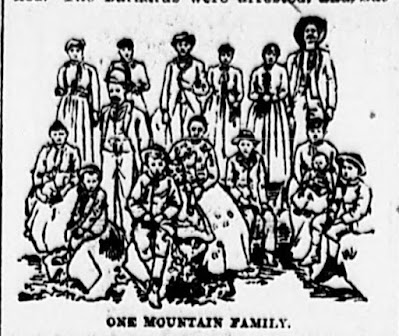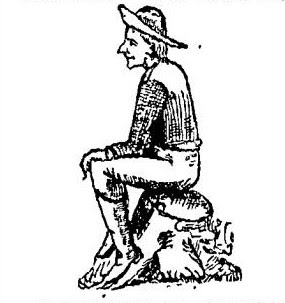The Information on Benjamin Collins Family is from Will Allen Dromgoole
"The Malungeons believe themselves to be of Cherokee and Portuguese extraction. They cannot account for the Portuguese extraction. They cannot account for the Portuguese blood, but are very bold in declaring themselves a remnant of those tribes, still inhabiting the mountains of North Carolina, which refused to follow the tribes to the Reservation set aside for them W.A. Dromgoole
He was very tall and straight, with hawk-like eye, and long, coarse hair that fell about his well-shapen shoulders with that careless abandon which characterizes the free child of the forest. He wore neither shoes nor stockings, and his trousers were rolled back above the strong, well formed knee, showing the dusky skin which marked him of a race other than white or black.
Indian: the grandson of a chief, and the son of a full-blooded Cherokee. Such he claimed, and the most dubious would have yielded the point when, entering a small clearing near the bluff's edge, he mounted an overhanging rock and bent his sharp, penetrating gaze down upon the valley below, warm with the October sunset. No lynx-eyed warrior ever scanned the white man's country with more earnest thoroughness than did he that mist-mellowed, far-away valley of the Clinch.
The dark face of the Malungeon grew stern. He had felt some pride in being “a charmer” for the afflicted and the bewitched — but his religion well, he was not prepared to give that up; he had only just begun to learn to feel at home in it. Still, it was good to be a healer; his grandfather, old Jordan Collins, had been a healer too, - a healer and a chief; a full-blooded Cherokee chief. No doubt about that: it was on the records.
The musician ceased playing: the fiddle lay across his knee. Now and then his hand strayed among the mellow old strings, but only to caress them. His thoughts were far away among the days when old Jordan Collins had fiddled for the young people on Newman's Ridge and Black Water Swamp. Old Jordan was an Indian, “Soft Soul they called him, and he had been respected by the whites. No man had ever dared call old Jordan a negro: he was a Cherokee, feared and respected as a Cherokee.
And very like a king he looked, upon his rude, improvised throne. A king: the last of the kings indeed ; the last full-blooded male representative of that strange, unclaimed clan — the Malungeons. A chief! such he felt himself for one brief, transitory moment. And these were his people, this handful, which the wanton vagaries of fancy multiplied to myriad millions. His eye kindled, his full chest rose and fell, while the old sparkle danced in his eye, and the proud flush sprang to his dusky cheek.
“Yes, King. Sing yer gran'dad's song - Ole Jording's song."
The fiddle did not trouble itself to follow the voice. With his hand he still twanged the old dance-melody, while the strong, stern, quiverless voice broke into the quaint, rhymeless hymn that he sung at the meeting-house, at the graveyard above the newly-dead, or in the echoing forest as he tramped home at noon or at midnight from the still.
Meh wife en meh deah chilring."
“Meh lillul chilring I loves 'em so.”
“() cud I once mo'see 'em,
An' gi' thum ther las' fai’well word,
Tell we shall meet in Heavin."

[Calloway's Family - Count Them]
Old Benjamin Collins, one of the pioneers, was older than Vardy, but came to Tennessee a trifle later. He had quite a large family of children, among them Edmond, Mileyton, Marler, Harry, Andrew, Zeke, Jordon. From Jordan Collins descended Calloway Collins who is still living today and from whom I obtained some valuable information.
The original Collins people were Indian, there is no doubt about that, and they lived as the Indians lived until sometime after the first white man appeared among them. Will Allen Dromgoole ~1890
--------------------------------------------------------------------------
“Vardy Collins, Shepherd Gibson, Benjamin Collins, Solomon Collins, Paul Bunch and the Goodmans, chiefs and the rest of them settled here about the year 1804, possibly about the year 1795, but al these men above named, who are called Melungeons" Lewis Jarvis ~1903
---------------------------------------------------------------------------------------------------------------------
VIATOR." Rogersville, Tenn. January 1876
Benjamin appears on the Grayson County Virginia Tax List with Milleton Collins through the years 1794 until 1802 when Milleton and Avy sell their land on Big Reed Island. Benjamin of course named two of his sons Milleton and Benjamin who lived on top and along the spurs of Newmans Ridge.
The Fincastle 1772 and 1773 list includes: David (Indian lands), Ambrose, John, John Jr., Charles (Indian lands), Elisha, Samuel (Indian land), Lewis, George (Indian land) Collins and Micajer Bunch (Indian Land).
[Note; In 1781 after the War, Lewis Collins returned home to find his father had moved to
80 acres Big Reed Island Pine & Snake Cr [in modern Carroll Co.] & New River Grants 29-325
Thomas Collins was living on the Flatt River in 1777 when it was cut from Orange County to form Caswell County. The first Caswell County Tax List included Martin, Paul, Milleton/Middleton and Charles Collins.
Solomon Collins born 1763 Johnston Co., North Carolina entered the Revolutionary War from Caswell County Pension Application Excerpt
----------------------------------------------------------------------------------















